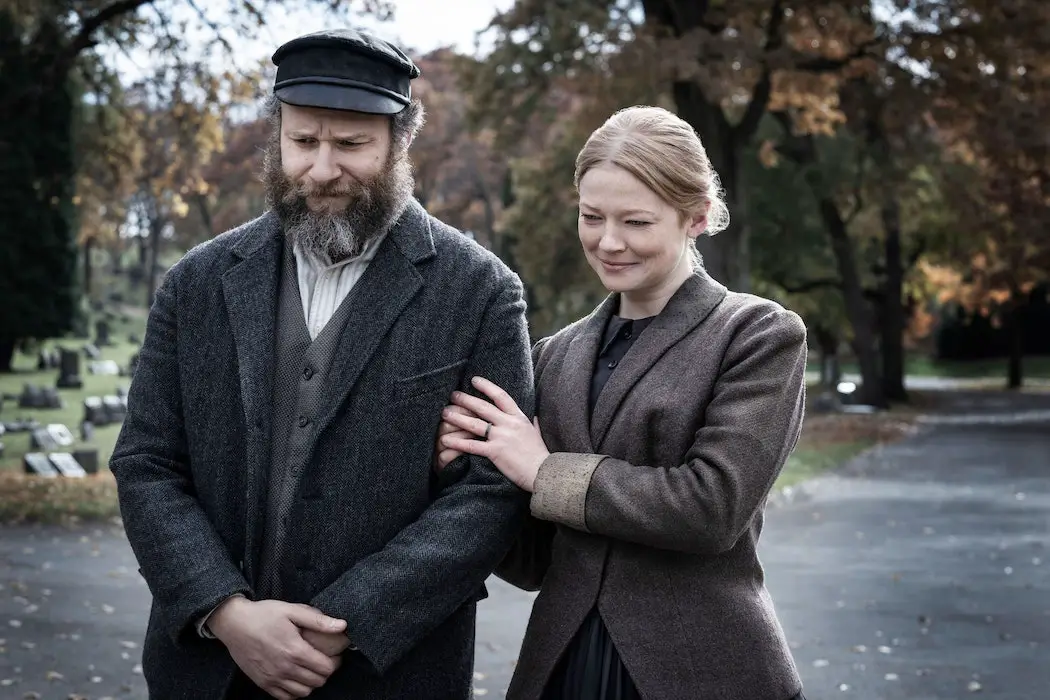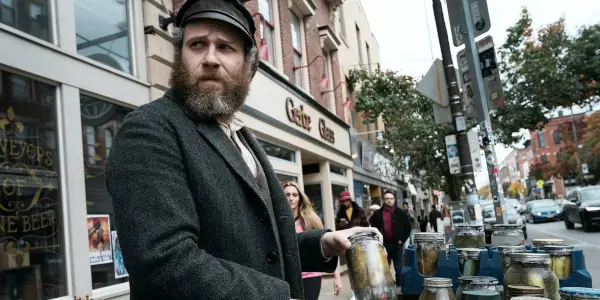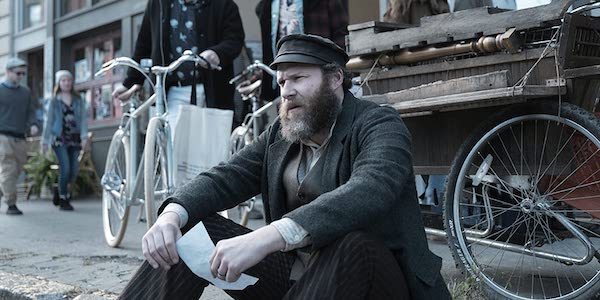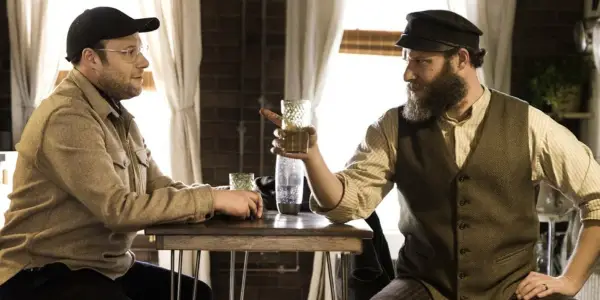AN AMERICAN PICKLE: A Big, Silly Idea with a Big Heart

Kevin L. Lee is an Asian-American critic, producer, screenwriter and…
We need more weird movies like An American Pickle. The ridiculous premise of a man being miraculously preserved for a hundred years in a pickle brine was never the point. It’s just a silly thing for us to accept and get past quickly so we can get to the heart of the story and find out what the filmmakers are really trying to say. What I got was something intentionally illogical, tonally wacky, and surprisingly personal.
It Works Because It Plays Like a Fantasy
Seth Rogen comedies perform best when his character is down on his luck. At this point, the man has figured himself out. He’s the guy who would walk along the street in the rain and a car would drive by and splash water all over him. He’s the guy who would somehow get coffee spilled on himself. It’s funny but you feel sympathetic for him. It works every time without fail and given that this film opens with Rogen having his shovel broken twice within the first minute, I knew I was going to have fun.
Like some of the best Simpsons or South Park episodes, An American Pickle stretches its hilarious premise to great effect by exaggerating the personalities and behaviors of every human being in the film. Pretty much everyone outside of Rogen’s Herschel Greenbaum and his great-grandson Ben is a caricature here; it’s a decision that allows the script to shrug off a lot of questionable moments. How did the man survive 100 years? I don’t know, but it makes sense because the scientist says so! Everyone nods in unison because we’re all good here. We good, right? Cool! Let’s keep moving along. This silliness stays throughout the film, coloring it into more of a soft fantasy than your typical drama.

With this approach, An American Pickle could afford to be more tonally inconsistent. At one moment, Herschel’s in a bad situation. He makes a decision, and now he’s doing very well. Then in the next scene, he’s in a pickle again (pardon the pun). Certainly, writer Simon Rich, who wrote the script based on his own short story “Sell Out,” spends the second act playing with cause and effect to garner some laughs. Though there are a couple of places where I did question some character motivation, the film moves at such a breakneck pace that it’s easy for me to just let those things slide.
Plot vs. Story
The part where An American Pickle does occasionally stumble for me is the second act, where the film juggles plot and story together. The story is about Herschel and Ben meeting, both having no other family left but each other. Now they’re together and they have catching up to do, what’s next? This is where the film tries to find a plot, where Herschel becomes famous for his pickle business and controversial public statements. The script even goes so far as to have those statements made on Twitter, which brings to mind another figure who acts as he lives in the 18th century.

Though it doesn’t really serve the thematic core of the story, and half the time you’re guessing just where the film is heading, the plot gives the film its weird energy and momentum. I can say I laughed quite a bit, and thankfully the jokes this time is nowhere near the R-rated raunchy humor I came to expect from Rogen. With a bit of tongue-in-cheek farce, a touch of political satire, and a ton of pickles, An American Pickle might just win you over with its silliness. We need movies as tonally weird but confident as this one.
Say it with me: “Seth Rogen is a Dramatic Actor”
When I first heard of this premise, I suspected that the real story underneath was going to be about family and the generational gaps we inevitably have with one another. It’s no surprise that a man and his great-grandson could butt heads because of their different outlooks on life. But to see Rogen portray both on-screen is astounding.
In addition to the funny fish-out-of-water aspects, where Herschel doesn’t understand any of the technology going on in the modern world, there’s a raw vulnerability ever-present in both Herschel and Ben. They both lost someone close to them. For Herschel, who’s been preserved for over a hundred years, he lost his wife and future child. For Ben, he lost his parents in a car accident. Ironically, they both lost each other’s family.
Rogen taps into that vulnerability. While he uses that pain to find friction between Herschel and Ben in the second act, he uses that same pain to find common ground and understanding by the time the film comes to an end. The performance comes so naturally for him, and I suspect it’s because he sees a lot of himself in Herschel and Ben. This is probably the most personal film he’s ever done; at times, I thought he wrote and directed this himself.

Rogen has publicly shared that the filming crew had to essentially shoot the film twice – the first time is with Rogen and his naturally grown-out beard to play Herschel, and the second time is after he shaves to play Ben. I promise you that you won’t notice any emotional disconnect. Rogen plays off of himself as he knows himself in and out. With this film, he joins actors like Lupita Nyong’o, Jake Gyllenhaal, and Armie Hammer for bringing out excellent doppelganger or “fake twin” performances in recent movie history.
A lot of credit needs to be given to the first-time director Brandon Trost, who has worked with Rogen as a cinematographer on past titles like This is the End and Neighbors, but he has also worked on small intimate dramas like The Diary of a Teenage Girl and Can You Ever Forgive Me? An American Pickle proves that even in the director’s chair, Trost is in control, and he makes simple artistic decisions that I find to be in good taste.
Conclusion
During Herschel’s backstory and narration, the color is more washed out, the aspect ratio is at 4:3, and every shot has a vignette blur around the edges, making it one color aberration away from looking like a real old photograph. He doesn’t hold back on montages being as bombastic as they can be; he’s willing to cut from one scene to another for an instant reaction, and after all that, he’s willing to just let quiet scenes be quiet for a moment and let Seth Rogen show his dramatic chops. No doubt, there were a couple surprises in this film that caught me off guard, and there is at least one genuinely touching callback/payoff. When you got me feeling emotional over seltzer water, I know you are doing something right.
The funny thing about pickles is I don’t like them alone, but I think they go really well with other things. An American Pickle works because it’s many things – it’s preposterous, funny, and sweet. Its heart is in the right place.
Did you see An American Pickle? What did you think of the film? Share below!
An American Pickle was released on HBO Max on August 6, 2020.
Watch An American Pickle
Does content like this matter to you?
Become a Member and support film journalism. Unlock access to all of Film Inquiry`s great articles. Join a community of like-minded readers who are passionate about cinema - get access to our private members Network, give back to independent filmmakers, and more.
Kevin L. Lee is an Asian-American critic, producer, screenwriter and director based in New York City. A champion of the creative process, Kevin has consulted, written, and produced several short films from development to principal photography to festival premiere. He has over 10 years of marketing and writing experience in film criticism and journalism, ranging from blockbusters to foreign indie films, and has developed a reputation of being “an omnivore of cinema.” He recently finished his MFA in film producing at Columbia University and is currently working in film and TV development for production companies.













